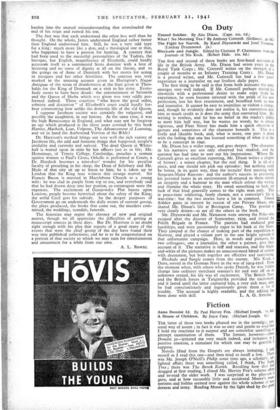On Duty
Tinned Soldier. By Alec Dixon. (Cape. los. 6d.) Tam first and second of these books are first-hand accounts of life in the British Anny. Mr. Dixon had seven years in the Royal Tank Corps ; Mr. Cotterell writes on the strength of a couple of months at an Infantry Training Centre. Mr. Dixon is a proved writer, and Mr. Cotterell has had a few years' experience as a journalist on our liveliest daily paper. The first thing to be said is that from both accounts the army emerges very well indeed. If Mr. Cotterell perhaps started h.N chronicle with a professional desire to make copy from his experience, he soon become infected-with the pride of his new profession, lost his first resentment, and benefited both as man and journalist. It cannot be easy to assimilate so violent a change, and, though he evidently does not realise it, his conversion does him as much credit as it does the army that converted him. H:, writing is restless, and he has no belief in the reader's ability to meet him half way, but he wastes no words, he is always vigorous, and Fleet Street has made him a quick observer of gesture and sometimes of the character beneath it. This is a lively and likeable book, and, what is more, one puts it down with the feeling that one has learned something of what it is like to be a conscript in 1941.
Mr. Dixon has a wider range, and goes deeper. The characters in his narrative are not only observed but studied, and the narrator has had time to sort out his impressions. Where Mr. Cotterell gives us excellent reporting, Mr. Dixon writes a chapter of history : a minor chapter, but the real thing. It is all of a piece, and one should not pick out episodes : but nothing could be better, in its quiet way, than the recruits' first meeting with Sergeant-Major Ransom : and the author's success in preserving his personal tastes in an environment ill-attuned to them reveals an integrity and a humour in the man which colour the writing and illumine the whole story. He owed something to luck, yet luck of that kind generally comes to the right man only. This is peace-time soldiering, freely chosen, not a conscript's life in war-time : but the two stories have .a lot in common. Tinned Soldier gains in interest by reason of one Private Shaw, who shared Mr. Dixon's life at Bovington Camp. The portrait is very clearly drawn—as are all the others in the book.
Mr. Zbyszewski and Mr. Natanson were among the Poles who escaped after the disaster of September, 1939, and joined the Polish Brigade in France. The patriots had endured great hardships, and were passionately eager to hit back at the Nazis. They jumped at the chance of making part of the expedition to Norway, and played a valiant part in the one bright episode of that unfortunate campaign. Here, in words and pictures, the two colleagues, one a journalist, the other a painter, give their account of it. The narrative is stiff and staccato, and the black- and-white of the pictures makes an unaccustomed blend of realism with decoration, but both together are effective and convincing. Blockade and jungle comes from the enemy. Nis Kock, 3 Dane, served in the German Navy in the war of 1914-1918. From the moment when, with others who spoke Danish, he was bidden change into ordinary merchant seaman's kit and sent off on an unknown errand, his life was all excitement. The British Navy and the British forces in Tanganyika provided the excitement, and it lasted until the latter captured him, a very sick man, after he had conscientiously and ingeniously given them a lot of trouble. The account is highly readable, and the editing has






























 Previous page
Previous page